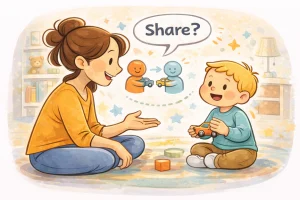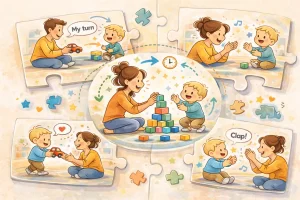Why More Parents Are Choosing Online Therapy for Kids
Last Updated: August 11, 2025
In a world where busy schedules and long commutes often get in the way of a child’s mental health support, online therapy for children has emerged as a game-changer. Whether your child is struggling with anxiety, ADHD, speech delays, or behavioral challenges, virtual therapy makes expert help just a click away. Delivered through secure video calls, interactive games, and parent-inclusive sessions, online therapy combines professional guidance with the comfort of home — removing the stress of travel and making mental health care more consistent, engaging, and accessible than ever.
1. Accessibility and Convenience
One of the most significant benefits of online therapy for children is its accessibility. Traditional in-person therapy often requires parents to drive long distances, which can be challenging and time-consuming. With online therapy, geographical barriers are no longer an issue. Whether you live in a bustling city or a remote town, your child can receive the mental health support they need from the comfort of your home.
Imagine the convenience of not having to worry about traffic or parking. Online therapy sessions can be easily scheduled to fit into your busy life, saving both time and money. No more rushing to make it to appointments or dealing with the stress of commuting. Instead, parents can focus on finding the best time for their child’s therapy sessions, making it a seamless part of the family’s routine.
Moreover, online therapy platforms often provide flexible scheduling options. This means you can choose a time that works best for your child, whether it’s after school, in the evening, or even on weekends. This flexibility is especially beneficial for families with hectic schedules, ensuring that therapy is consistently accessible without disrupting daily activities.
Comparison of Online Therapy and In-Person Therapy
| Feature | Online Therapy | In-Person Therapy |
|---|---|---|
| Accessibility | Available anywhere with an internet connection. | Limited to therapists within the local area. |
| Scheduling | Flexible, can be adjusted to fit family routines. | Fixed times, requires travel and planning. |
| Comfort | Conducted in the familiar home environment. | Takes place in the therapist’s office. |
| Engagement | Uses interactive tools and multimedia to engage children. | Relies on traditional face-to-face methods. |
| Privacy | Conducted privately at home, reducing stigma. | Visiting a therapist can feel stigmatizing. |
| Specialization | Easy access to specialists in various fields regardless of location. | Limited to specialists available locally. |
| Consistency | Sessions are less likely to be interrupted by external factors. | Disruptions due to travel, weather, or illness. |
| Parental Involvement | Parents can observe and participate more easily, understanding techniques used. | Limited opportunities for parents to observe sessions. |
2. Comfort and Familiarity
Children often feel most at ease in their own homes. The familiar surroundings of their room, favorite toys, and family members create a sense of security that is hard to replicate in a therapist’s office. Online therapy leverages this comfort, allowing children to participate in sessions from their safe space. This can make a significant difference in how open and communicative they are during therapy.
Therapists can use the home environment to their advantage. For example, they might incorporate a child’s favorite stuffed animal into the session or use their room’s decor to make therapy more engaging. This personalized approach helps children feel more connected and willing to share their thoughts and feelings.
The absence of a formal office setting can also reduce the intimidation factor. Children might find it easier to express themselves without the pressure of being in a new and unfamiliar place. This relaxed atmosphere encourages more genuine interactions, leading to more effective therapy outcomes.
3. Technological Engagement
One of the standout features of online therapy for children is the use of interactive tools and multimedia to make sessions more engaging. Traditional therapy can sometimes feel monotonous for young minds, but incorporating technology helps capture and maintain their interest.
Therapists often use a variety of digital tools such as interactive games, videos, and drawing programs during sessions. For instance, a therapist might use a storytelling app to help a child articulate their feelings or an interactive game to teach coping strategies. These activities not only make therapy fun but also enhance the learning process by keeping children motivated and engaged.
When it comes to choosing a platform for online speech therapy, Wellness Hub offers BASICS App, a comprehensive suite of tools designed specifically for therapists working with children. This goes beyond just video conferencing by integrating features like interactive games, a synchronized whiteboard, and progress tracking tools. BASICS App creates a more engaging and effective therapy experience for both therapists and children.
Additionally, technology allows therapists to tailor their approach to each child’s unique needs. For example, a child who loves drawing might benefit from digital art activities, while another who enjoys puzzles might find interactive problem-solving games more effective. This adaptability ensures that therapy is not only engaging but also personalized, addressing each child’s specific preferences and therapeutic goals.
4. Reduced Stigma and Privacy
Seeking therapy can be intimidating for children, especially when it involves visiting a therapist’s office. Online therapy helps reduce the stigma associated with mental health support by offering a more private and discreet way to receive help.
With online therapy, children can participate in sessions from the privacy of their own homes. This eliminates the need for physical visits, which can often feel daunting. The privacy of being at home can make children more comfortable and willing to open up, fostering a more productive therapeutic environment.
Moreover, the discretion provided by online therapy can encourage early intervention. When children and parents know that therapy can be done privately without anyone else knowing, they are more likely to seek help sooner rather than later. Early intervention is crucial for addressing mental health issues before they become more severe, leading to better long-term outcomes.
5. Increased Accessibility to Specialized Therapists
One of the remarkable benefits of online therapy is the expanded access to specialized therapists. In traditional settings, finding a therapist with specific expertise in child psychology, behavioral issues, or learning disabilities can be challenging, especially if you live in a remote area. Online therapy removes these geographical limitations, allowing you to connect with the right expert regardless of location.
For instance, if your child needs support for ADHD or anxiety, you can easily find a therapist who specializes in these areas without having to travel far from home. This access to specialized care ensures that your child receives tailored and effective treatment from professionals who understand their unique needs.
Families living in rural or underserved areas particularly benefit from this increased accessibility. They no longer have to settle for the nearest available therapist but can instead choose from a broader pool of qualified professionals. This means better care and more options for addressing specific mental health challenges.
6. Consistency in Care
Consistency is key to effective therapy, especially for children. Regular and uninterrupted sessions are crucial for making progress in mental health treatment. Online therapy ensures that therapy sessions remain consistent, even when life throws curveballs like illness, bad weather, or unexpected schedule changes.
When physical attendance is not possible, online therapy provides a seamless alternative. This flexibility means that children don’t have to miss out on their therapy sessions due to external factors. Consistent therapy helps build trust and rapport between the therapist and the child, which is essential for successful outcomes.
Hybrid options, combining in-person and online sessions, can also be a great solution. If an in-person session is canceled, it can be quickly rescheduled to an online format. This adaptability ensures that therapy remains a stable and ongoing part of the child’s routine, promoting continuous mental health support.
7. Flexible Scheduling
One of the most appreciated benefits of online therapy for children is its flexible scheduling, which can easily accommodate busy family routines. Traditional therapy sessions often require a fixed schedule that might not fit well with your child’s school hours or extracurricular activities. Online therapy, however, offers a much more adaptable solution.
With online therapy, parents can choose convenient times for their child’s sessions. Whether it’s right after school, in the evenings, or even on weekends, the flexibility allows you to select the best time that suits your family’s schedule. This makes it easier to integrate therapy into your child’s routine without causing disruptions to their daily life.
Moreover, the ease of rescheduling online therapy sessions is a significant advantage. Life is unpredictable, and sometimes appointments need to be changed. With online therapy, you can easily reschedule a session without the hassle of physical travel or the need to wait for the next available slot at a busy clinic. This ensures that your child doesn’t miss out on important therapy sessions, maintaining consistency in their mental health care.
For instance, if your child has a sudden school event or if you’re running late from work, a quick adjustment can be made to the therapy schedule. This kind of flexibility helps reduce stress for both parents and children, making the therapeutic process smoother and more effective.
8. Enhanced Parental Involvement
One of the key advantages of online therapy is the increased involvement of parents in their child’s therapy process. Unlike traditional therapy sessions, where parents might wait in a separate room, online therapy allows parents to observe sessions more closely. This can significantly enhance the overall effectiveness of the therapy.
Parents can watch and understand the therapy techniques being used, gaining insights into how these methods help their child. For instance, they can see how a therapist uses specific activities to encourage communication or manage anxiety. This understanding enables parents to reinforce these techniques at home, providing consistent support for their child outside of therapy sessions.
Moreover, being present during online therapy sessions can help parents feel more connected to their child’s progress. They can communicate directly with the therapist, ask questions, and receive real-time feedback. This collaborative approach ensures that everyone involved in the child’s care is on the same page, working together to achieve the best outcomes.
For example, if a therapist introduces a new coping strategy for dealing with stress, parents can observe how it’s implemented during the session. Later, they can help their child practice this technique in everyday situations, reinforcing the skills learned during therapy. This active participation not only boosts the child’s confidence but also strengthens the parent-child relationship.
Conclusion
Online therapy isn’t just an alternative — for many families, it’s the best fit. It eliminates distance barriers, connects your child with specialized therapists, and keeps therapy consistent, even during busy or unpredictable weeks. The familiar home setting encourages children to open up, while interactive tools keep them motivated. Most importantly, parents can actively participate and reinforce progress at home.
At Wellness Hub, we believe every child deserves accessible, high-quality mental health support. Our BASICS App offers engaging, secure, and personalized online therapy designed for children’s unique needs.
Learn more or book your child’s first session here: Wellness Hub Online Therapy
Frequently Asked Questions:
1. What is online therapy for children?
Online therapy for children, also known as teletherapy or e-therapy, is a form of mental health counseling that takes place over the internet through video calls, phone calls, or messaging. It allows children to receive professional support from the comfort of their own homes.
2. How does online therapy benefit children?
Online therapy benefits children by removing geographical barriers, providing access to specialized therapists, offering flexible scheduling, and allowing children to engage in sessions from a familiar environment. It also uses interactive tools and multimedia to make sessions engaging and effective.
3. Is online therapy as effective as in-person therapy for children?
Yes, online therapy can be as effective as in-person therapy for children. It provides the same professional support and techniques, with the added benefits of flexibility, accessibility, and comfort. The key is finding a qualified therapist who can connect well with your child.
4. How does online therapy ensure privacy and confidentiality?
Online therapy platforms use secure, encrypted technologies to protect privacy and confidentiality. Sessions are conducted in private, virtual settings, ensuring that your child’s personal information and therapy discussions remain confidential.
5. Can parents be involved in their child’s online therapy sessions?
Yes, online therapy enhances parental involvement. Parents can observe sessions, understand the techniques being used, and communicate directly with the therapist. This helps parents support their child’s mental health outside of therapy sessions.
6. What types of issues can online therapy help address in children?
Online therapy can help address a wide range of issues in children, including anxiety, depression, ADHD, behavioral problems, learning disabilities, and more. Specialized therapists are available to provide targeted support for these specific needs.
7. How do I find a qualified online therapist for my child?
You can find qualified online therapists through reputable therapy platforms, mental health organizations, or referrals from your child’s school or pediatrician. Ensure the therapist is licensed and has experience working with children.
8. What should I prepare for my child’s first online therapy session?
For the first online therapy session, ensure your child has a quiet, comfortable space with a stable internet connection. Have any necessary devices ready, such as a computer, tablet, or phone. Be prepared to discuss your child’s needs and goals with the therapist.
9. How does online therapy fit into a busy family schedule?
Online therapy offers flexible scheduling options, allowing sessions to be scheduled at convenient times such as after school, in the evenings, or on weekends. This flexibility helps integrate therapy into busy family routines without causing disruptions.
10. Is online therapy covered by insurance?
Many insurance plans now cover online therapy, but coverage can vary. Check with your insurance provider to understand your specific coverage for teletherapy services.
About the Author:
Anuradha Karanam
Speech-language pathologist (7+ years of experience)
Anuradha Karanam is a skilled speech-language pathologist with over 6 years of experience. Fluent in Tamil, Telugu, Hindi, and English, she specializes in parent counseling, speech sound disorders, fluency assessment, and speech-language evaluations. Anuradha excels at working with children with developmental disorders, offering creative and effective therapy programs. Currently, at Wellness Hub, she holds a BASLP degree and is registered with the RCI (CRR No A85500). Her patience, ambition, and dedication make her a trusted expert. Connect with Anuradha to learn more about how she can help you or your loved one find their voice.
Book your Free Consultation Today
Parent/Caregiver Info:
Client’s Details:
* Error Message









